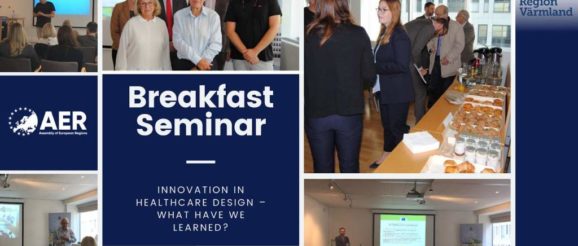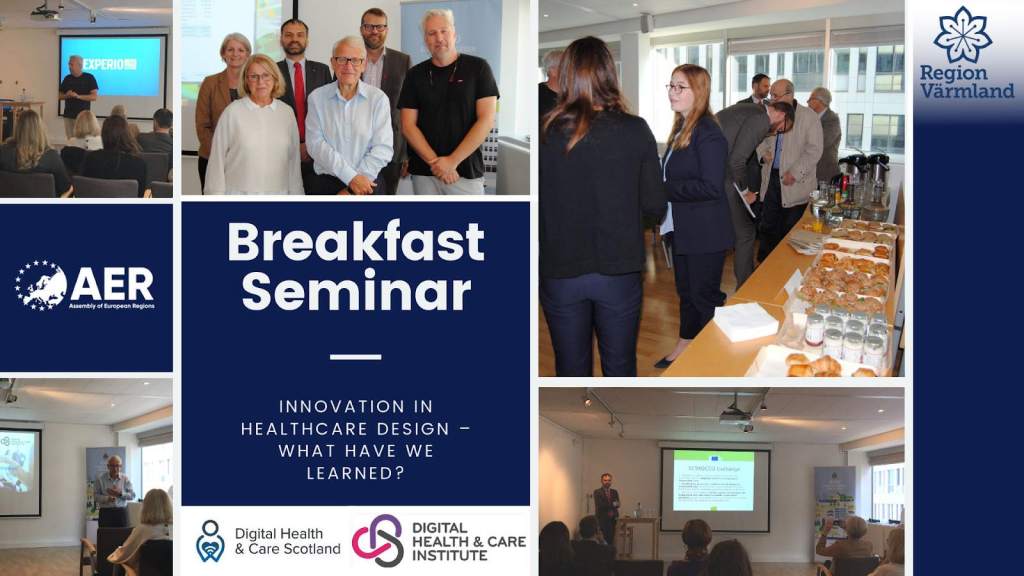An Injection of Reality at AER Breakfast Seminar on Digital and Healthcare Innovation


Innovating is always an ambitious goal but there is much to be learned from one another. The Breakfast Seminar on “Innovation in Healthcare Design – what have we learned?” is a perfect example of mutual learning. On Tuesday 10 September, AER hosted an insightful seminar organised in partnership with its members, Region Värmland (SE) and the Scottish Government TEC and Digital Healthcare Innovation Division.
The breakfast seminar was an opportunity to highlight a European perspective on digital healthcare innovation and subsequently, look more specifically at the Swedish and Scottish experiences. The seminar gave all participants the opportunity to discuss this relevant and ever-present issue and to interact with regions who have already made strides in digital transformation.
A nutritious Nordic breakfast marked the beginning of the event as Kenneth Johannesson, AER Committee on Social Policy and Public Health and Councillor from the Region Värmland and Donna Henderson from the Scottish Government gave a warm introduction to the topic at hand and the invited expert speakers.
In Integration We Trust
Filip Domanski, from the European Commission, was first to take the floor as he explained the EU strategy for digital and healthcare innovation. He emphasised that joint action is needed in order to transform healthcare and that an exchange of failures is as useful as the exchange of good practices. Integration and digitisation are at the heart of the Commission’s strategy, he highlighted the importance of two projects co-financed by the European Commission: SCIROCCO and VIGOUR. Both projects will support health and social care authorities to improve the patient’s experience by improving the integration of health and care services. AER’s involvement in the SCIROCCO project is to be commended.
Ever Heard of “Service Logic”?
By entering the core of the topic, Tomas Edman, Coordinator of the Experio Lab Sweden, shifted the attention to the approach adopted in Sweden. He introduced the concept of ‘Service Logic’, which means that value is created in the meeting between the patient and the healthcare services. Patients, therefore, are an important resource for the development and use of healthcare services. He argued that this kind of systematic shift is essential to really transform healthcare services instead of merely digitising it. According to Edman, the only thing that has to be contagious is a user-centric approach – involving citizens will help to build an effective and replicable prototype.
Care 4.0 – Let’s Think Digital
With the contribution of George Crooks, Professor and CEO at the Digital Health and Care Institute from Scotland, the debate moved to the Scottish approach for digital health. Professor Crooks stressed that an effective transformation in the health sector requires, obviously, more time than a Parliamentary mandate, therefore, it is fundamental to achieve a citizen-driven method. Reflecting on the practices employed around the EU, Scotland has managed to design an effective strategy to improve their health system and guarantee safe, effective and patient-centred services.
The Breakfast Seminar gave participants the opportunity to broaden their horizons and learn more about their counterparts’ strategies as regards healthcare. The key takeaway was that a patient-centred method might be the best, but in order to improve the overall situation, all public services have to change their approach, not solely the healthcare system.
Thanks to the input of the Region Värmland and the Scottish Government TEC and Digital Health Care Innovation Division, we can say that the Breakfast Seminar was successful, AER’s aim, however, is to organise more events similar to this one and to involve more and more policymakers, civil servants and experts with the intention of creating not only seminars but fruitful meetings of minds.
Follow AER!
The post An Injection of Reality at AER Breakfast Seminar on Digital and Healthcare Innovation appeared first on Assembly of European Regions.
